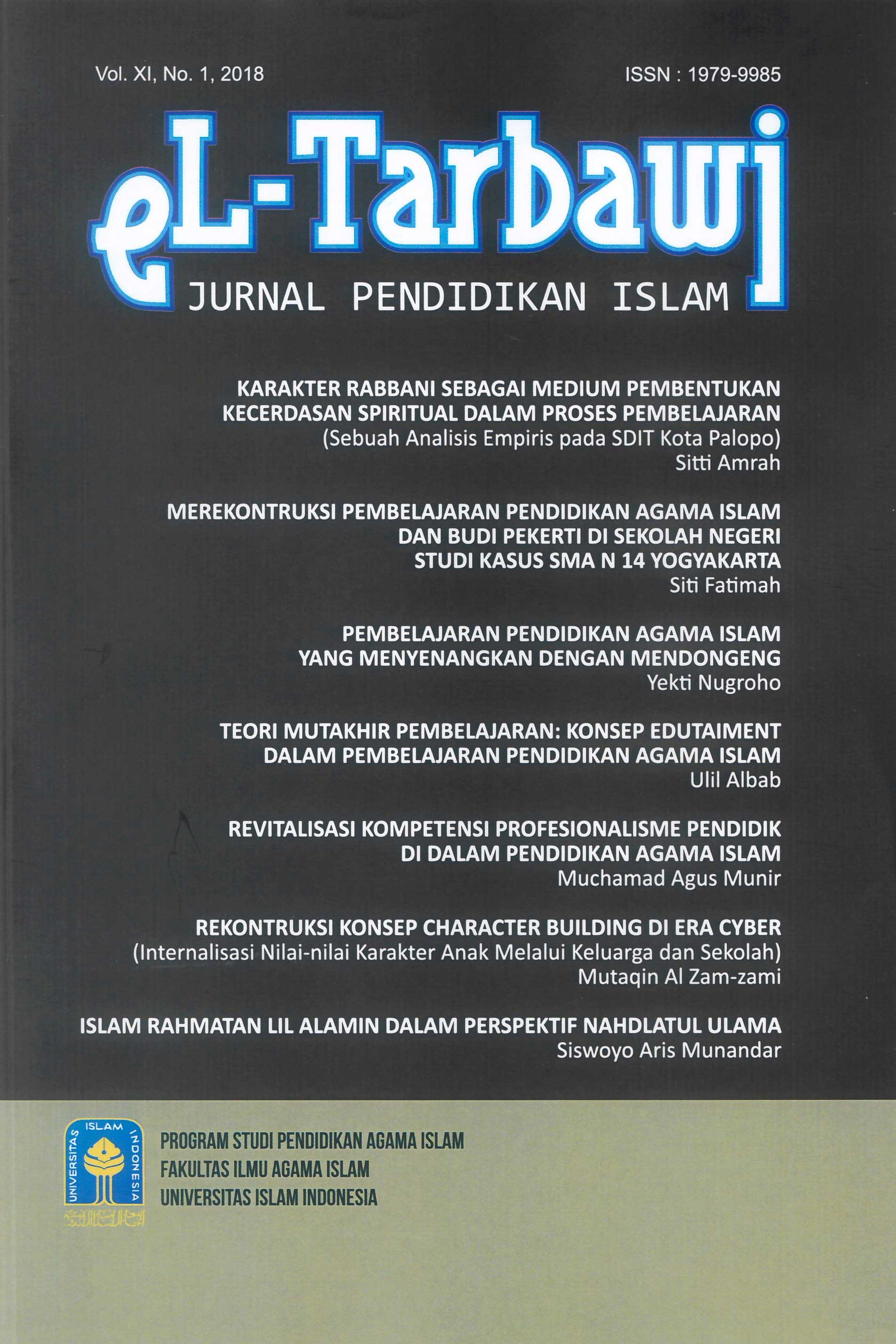Main Article Content
Abstract
At present various facilities and sophistication are offered as an impact of the development of science and knowledge. The impact can be in the form of positive impacts and also negative impacts. Negative impacts that are not minimized by the formation of children’s character will damage human life. That’s why character education should be conceptualized in education both at school and in the family. This scientific article will try to explain how theoretical reconstruction and practice in character building concepts and how to analyze character building concepts so that they can be implemented by families and schools. By conducting library research on various documents, the author can gather that the theoretical construction and practice in the concept of character building starts from the role of the family. In addition, in its implementation, teachers or parents can use various strategies while instilling values related to attitudes and morals.
Keywords : value internalization, character building, cyber era
Article Details
Authors retain copyright and grant the journal right of first publication with the work simultaneously licensed under a Creative Commons Attribution (CC-BY-SA) 4.0 License that allows others to share the work with an acknowledgment of the work’s authorship and initial publication in this journal.
References
- As-Suyuti, Jalaluddin, & Jalaludin al-Mahalli. Tafsir Jalalain. Kairo: Dar al-Hadits.
- Fakih, Mansour. (2001). Kapitalisme Pendidikan. Yogyakarta: Pustaka Pelajar.
- Harrel, Keith. (2009). Attitude is Everything: Ubah Sikap Anda, maka Hidup Anda akan Berubah! Sikap Anda Hari Ini Menentukan Sukses di Masa Depan. Jakarta: Gramedia Pustaka Utama.
- Illahi, Muhammad Takdir. (2012). Revitalisasi Pendidikan Berbasis Moral. Jakarta: Ar- Ruzz Media.
- Ismail, Abu al-Fida" bin „Umar bin Katsir. Tafsir al-Qur'an al-Adhim. Beirut: Dar al- Haram.
- Kartini. (1996). Pengantar Metodologi Riset Sosial. Bandung: Mandar Maju.
- Mu’in, Fatchul. (2011). Pendidikan Karakter Konstruksi Teoritik & Praktik. Yogyakarta: Ar-Ruzz Media.
- Munir, Abdullah. (2010). Pendidikan Karakter Membangun Karakter Anak Sejak dari Rumah. Yogyakarta: Pedagogia
- Saleh, Muwafik. (2013). Membangun Karakter dengan Hati Nurani. Jakarta: Erlangga.
- Samani, Muchlas & Hariyanto. (2013). Pendidikan Karakter. Bandung: Remaja Rosdakarya.
- Shihab, Quraish. (2002). Tafsir al-Misbah: Pesan, Kesan, dan Keserasian al-Qur’an. Jakarta: Lentera Hati
- Zubaedi. (2012). Desain Pendidikan Karakter: Konsepsi dan Aplikasinya dalam Lembaga Pendidikan. Jakarta: Kencana Prenada Media Group.
References
As-Suyuti, Jalaluddin, & Jalaludin al-Mahalli. Tafsir Jalalain. Kairo: Dar al-Hadits.
Fakih, Mansour. (2001). Kapitalisme Pendidikan. Yogyakarta: Pustaka Pelajar.
Harrel, Keith. (2009). Attitude is Everything: Ubah Sikap Anda, maka Hidup Anda akan Berubah! Sikap Anda Hari Ini Menentukan Sukses di Masa Depan. Jakarta: Gramedia Pustaka Utama.
Illahi, Muhammad Takdir. (2012). Revitalisasi Pendidikan Berbasis Moral. Jakarta: Ar- Ruzz Media.
Ismail, Abu al-Fida" bin „Umar bin Katsir. Tafsir al-Qur'an al-Adhim. Beirut: Dar al- Haram.
Kartini. (1996). Pengantar Metodologi Riset Sosial. Bandung: Mandar Maju.
Mu’in, Fatchul. (2011). Pendidikan Karakter Konstruksi Teoritik & Praktik. Yogyakarta: Ar-Ruzz Media.
Munir, Abdullah. (2010). Pendidikan Karakter Membangun Karakter Anak Sejak dari Rumah. Yogyakarta: Pedagogia
Saleh, Muwafik. (2013). Membangun Karakter dengan Hati Nurani. Jakarta: Erlangga.
Samani, Muchlas & Hariyanto. (2013). Pendidikan Karakter. Bandung: Remaja Rosdakarya.
Shihab, Quraish. (2002). Tafsir al-Misbah: Pesan, Kesan, dan Keserasian al-Qur’an. Jakarta: Lentera Hati
Zubaedi. (2012). Desain Pendidikan Karakter: Konsepsi dan Aplikasinya dalam Lembaga Pendidikan. Jakarta: Kencana Prenada Media Group.
